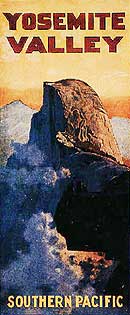Friday August
24, 2001
Governors
Call For Action
Secretaries
of State Join In!
By Chuck Burley, Contributor
YOSEMITE -- On Friday,
The Western Governors Association and the Secretaries of
Agriculture and Interior signed a 10-year comprehensive strategy
to address issues associated with wildfires.
The strategy for improved prevention and
suppression of wildfires calls for aggressive thinning and prescribed
fires. Agriculture Secretary Ann Veneman stated that the strategy
won't overlap with the Forest Service's controversial roadless area
policy. .
Veneman also said that both she and Interior
Secretary Gale Norton have directed their respective staffs to jointly
implement the strategy.
However, before anything can be implemented,
there must first be an implementation plan developed. .
The strategy calls for the implementation
plan to be developed by May 2002. That plan will contain the nuts
and bolts of how to address over the next ten years the problems
facing our national wildlands. .
According to Veneman, the plan must contain
a single set of standards and direction for all government agencies.
Furthermore, it must be effective and provide clear priorities.
Other issues raised repeatedly by administration officials, governors
and panelists were the need for accountability, timeliness, and
the need to improve and streamline the process. .
Perhaps the best summary of how important
this is was stated by South Dakota Governor William Janklow, who
said, "World War II only took America 3 ½ years to prepare and fight
we can't wait that long - - the forests will be gone."
Members of the core team that helped write
the 10 year strategy were present to join Forest Service Chief Dale
Bosworth and National Fire Plan Director Lyle Laverty in presenting
the plan..
Panelists included: John Howard, Union
County Commissioner (OR); Jason Campbell, National Cattlemen
Association; Greg Aplet, The Wilderness Society; and
Chuck Burley, AFRC.
Also discussed at the meeting was how a
better network of electricity transmission lines could go a long
way in solving the energy supply crisis here in the west.
Participating in the discussion with the
governors were: Jim Connaughton, Chair of the Council on Environmental
Quality; Bob Card, Undersecretary of Energy and Nora
Brownell, Federal Energy Regulatory Commission.
As a result of their discussions, the governors
adopted a "Western States Energy Policy Roadmap" insuring
that states will continue to play a pivotal role in electrical power
decisions and Congress should allow states to create regional mechanisms
to decide their common power issues. .
The meeting was well attended by Wester
governors including California Governor Gray Davis(D).
On August 15, Senate Majority Leader Tom
Daschle (D-SD) held a Forest Summit in Rapid City, South Dakota.
.
The purpose was to begin a dialogue to
seek solutions to the gridlock facing the Black Hills National
Forest. A panel of speakers including representatives of recreation,
Native American tribes, and environmentalists presented views on
the problems facing the forest.
There was little doubt left after the panel
was done that the crisis in the Black Hills is similar to those
experienced by the West and the nation. These include forest health,
risk of wildfire and a process so cumbersome that the Forest Service
cannot get anything done in a timely manner. Chief Bosworth said
that fixing the process, or as he calls it "paralysis by analysis,"
is one of his priorities. .
Daschle laid out his three-part proposal
to address the issues. First he'd like to create a Black Hills
Advisory Committee to seek common ground and try to arrive at
some solutions. Second he announced his intention to seek legislation
to establish one or more pilot projects in the Black Hills to
demonstrate the ability to address the forest health and wildfire
problems using thinning and other activities. .
Last he would like to see an intensive
review of the Forest Service decision-making process at the national
level. Reaction to Daschle's proposal was mixed among the panelists.
Most were in favor or at least willing to consider his proposal..
However, the local Sierra Club representative
opposed the idea saying that an advisory committee is not needed
since there's already enough public participation and that active
management won't solve the problems. .
In fact, the Sierra Club representative
said "...the only reason the problem exists today is due to
past logging and cutting trees won't do any good."
Letter
to the Editor

|







